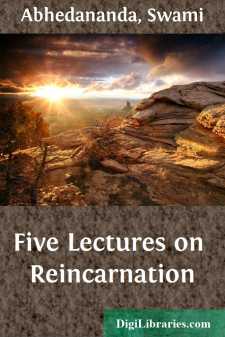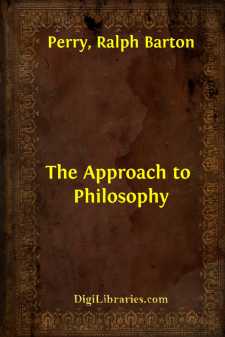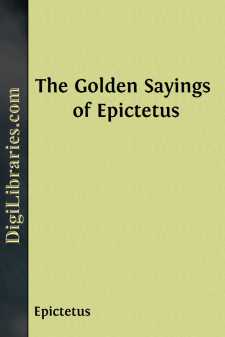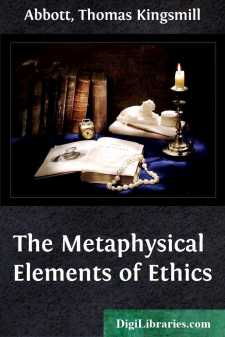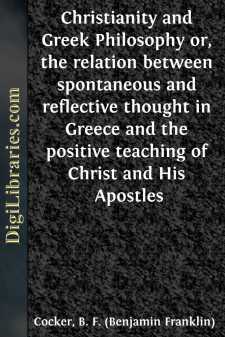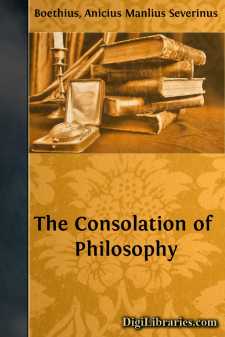Philosophy
- Aesthetics 11
- Eastern 1
- Ethics & Moral Philosophy 2
- General 30
- Hindu 2
- History & Surveys 3
- Logic 1
- Metaphysics 3
- Political 1
- Religious 7
- Social 3
- Taoist 1
Philosophy Books
Sort by:
by:
John Dewey
Chapter One: Education as a Necessity of Life 1. Renewal of Life by Transmission. The most notable distinction between living and inanimate things is that the former maintain themselves by renewal. A stone when struck resists. If its resistance is greater than the force of the blow struck, it remains outwardly unchanged. Otherwise, it is shattered into smaller bits. Never does the stone attempt to...
more...
I. Reincarnation The visible phenomena of the universe are bound by the universal law of cause and effect. The effect is visible or perceptible, while the cause is invisible or imperceptible. The falling of an apple from a tree is the effect of a certain invisible force called gravitation. Although the force cannot be perceived by the senses, its expression is visible. All perceptible phenomena are but...
more...
by:
Confucius
INTRODUCTION Confucius was born in the year 550 b.c., in the land of Lu, in a small village, situated in the western part of the modern province of Shantung. His name was K'ung Ch'iu, and his style (corresponding to our Christian name) was Chung-ni. His countrymen speak of him as K'ung Fu-tzu, the Master, or philosopher K'ung. This expression was altered into Confucius by the Jesuit...
more...
by:
George Santayana
Whether Chaos or Order lay at the beginning of things is a question once much debated in the schools but afterward long in abeyance, not so much because it had been solved as because one party had been silenced by social pressure. The question is bound to recur in an age when observation and dialectic again freely confront each other. Naturalists look back to chaos since they observe everything growing...
more...
PREFACE In an essay on "The Problem of Philosophy at the Present Time," Professor Edward Caird says that "philosophy is not a first venture into a new field of thought, but the rethinking of a secular and religious consciousness which has been developed, in the main, independently of philosophy." If there be any inspiration and originality in this book, they are due to my great desire...
more...
by:
Epictetus
I Are these the only works of Providence within us? What words suffice to praise or set them forth? Had we but understanding, should we ever cease hymning and blessing the Divine Power, both openly and in secret, and telling of His gracious gifts? Whether digging or ploughing or eating, should we not sing the hymn to God:— Great is God, for that He hath given us such instruments to till the ground...
more...
If there exists on any subject a philosophy (that is, a system of rational knowledge based on concepts), then there must also be for this philosophy a system of pure rational concepts, independent of any condition of intuition, in other words, a metaphysic. It may be asked whether metaphysical elements are required also for every practical philosophy, which is the doctrine of duties, and therefore also...
more...
INTRODUCTION. OUR age is retrospective. It builds the sepulchres of the fathers. It writes biographies, histories, and criticism. The foregoing generations beheld God and nature face to face; we, through their eyes. Why should not we also enjoy an original relation to the universe? Why should not we have a poetry and philosophy of insight and not of tradition, and a religion by revelation to us, and...
more...
PREFACE. In preparing the present volume, the writer has been actuated by a conscientious desire to deepen and vivify our faith in the Christian system of truth, by showing that it does not rest solely on a special class of facts, but upon all the facts of nature and humanity; that its authority does not repose alone on the peculiar and supernatural events which transpired in Palestine, but also on the...
more...
SONG I.Boethius' Complaint.Who wrought my studious numbersSmoothly once in happier days,Now perforce in tears and sadnessLearn a mournful strain to raise.Lo, the Muses, grief-dishevelled,Guide my pen and voice my woe;Down their cheeks unfeigned the tear dropsTo my sad complainings flow!These alone in danger's hourFaithful found, have dared attendOn the footsteps of the exileTo his lonely...
more...



